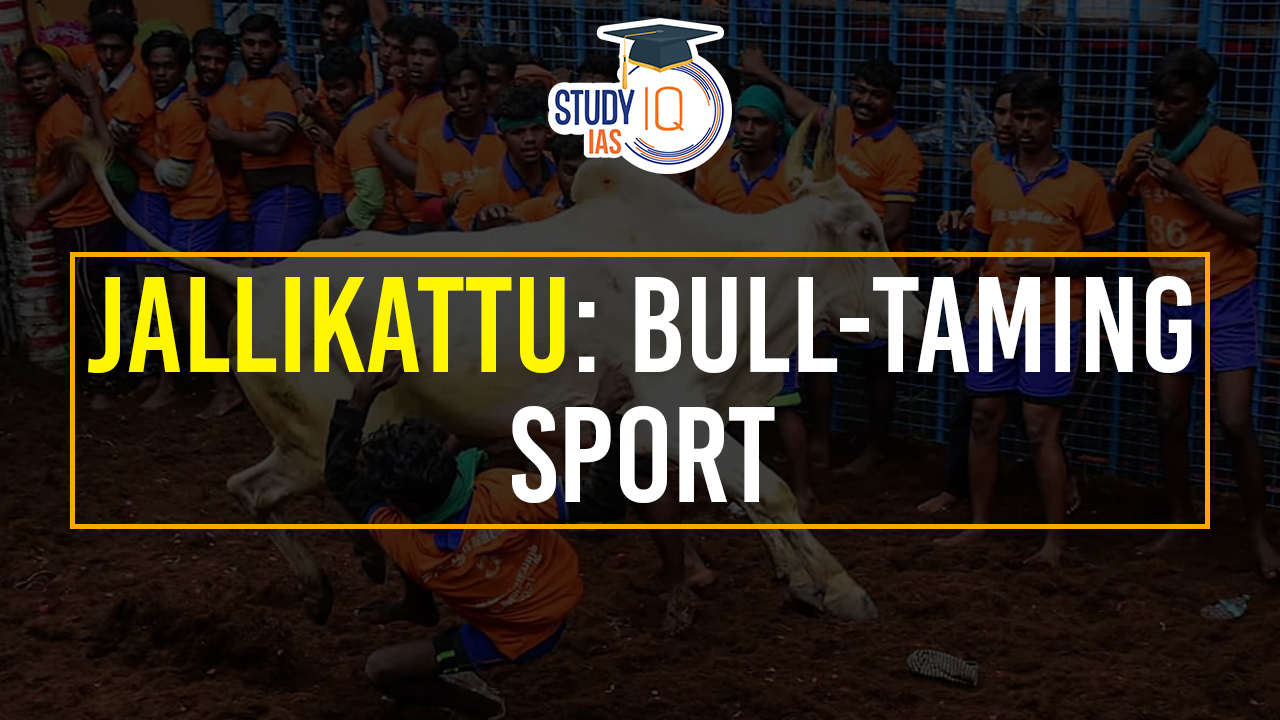Table of Contents
Jallikattu Festival is a traditional bull-taming sport that is popular in the southern Indian state of Tamil Nadu. The word “Jallikattu” is derived from the Tamil words “Jalli” (meaning gold or silver coins) and “Kattu” (meaning tied), referring to the practice of tying coins to the horns of the bulls as prizes for the participants. This cultural event has a long history and is often associated with the Pongal festival, a harvest festival celebrated in Tamil Nadu. Know all about the Jallikattu Festival 2025 and its history.
Jallikattu Festival Tamil Nadu 2025: Tragedy Strikes Amidst Celebrations
The Jallikattu Festival 2025 in Tamil Nadu, celebrated during the Kanum Pongal festivities, has been marred by several tragic incidents, resulting in the loss of seven lives. The victims, primarily spectators and a bull owner, faced fatal accidents during the traditional bull-taming sport events of Jallikattu and Manjuvirattu. These events, integral to Tamil Nadu’s cultural heritage, have once again highlighted the need for stringent safety measures.
What is Jallikattu?
- Jallikattu is a bull-taming sport conducted during Mattu Pongal, the third day of the Pongal festival.
- Also known as eru thazhuvuthal or manju virattu.
- Bulls, symbolizing strength and utility in agriculture, play a central role in the event.
- Participants attempt to embrace the bull’s hump, aiming to bring it to a controlled stop.
Jallikattu Festival: Bull-Taming Sport
Jallikattu is a traditional bull-taming sport that is celebrated in Tamil Nadu as part of the Pongal festival. The sport involves releasing a bull into a crowd of people and having participants try to grab the bull’s hump to bring it to a stop. The name “Jallikattu” comes from the words “Calli” (coins) and “Kattu” (tie). The tradition is based on attaching a bundle of coins to the bull’s horns, which participants try to retrieve. Jallikattu is also known as ēru taḻuvuṭal and mañcuvirattu. It is celebrated to worship cattle stock.
Jallikattu Festival 2025
The Jallikattu Festival 2025 in Tamil Nadu has once again captured the attention of the world with its thrilling bull-taming events, showcasing the state’s rich cultural heritage. Held during the Pongal celebrations, Jallikattu is more than just a sport; it is a symbol of Tamil pride and tradition.
| Jallikattu Festival Overview | |
| Celebration Occasion | Pongal festival in Tamil Nadu |
| Main Event | Traditional bull-taming sport – Jallikattu |
| Objective | Participants attempt to grab the bull’s hump to bring it to a stop |
| Name Origin | “Jallikattu” from “Calli” (coins) and “Kattu” (tie) – Referring to the tradition of tying coins to the bull’s horns |
| Alternate Names | Ēru Taḻuvuṭal and Mañcuvirattu |
| Cultural Significance | Celebration of worship for cattle stock |
| Symbolic Element | Attaching a bundle of coins to the bull’s horns for participants to retrieve |
Highlights of Jallikattu Festival 2025
1. Grand Kickoff at Avaniyapuram: The festival began with great enthusiasm in Avaniyapuram, Madurai, where 1,100 bulls and 900 bull-tamers participated. The event was marked by fierce competition and immense crowd support.
2. Prestigious Prizes: The best bull of the event was awarded a tractor worth ₹11 lakh, while the best bull-tamer received a car worth ₹8 lakh. These lucrative prizes added to the excitement and competitiveness of the event.
3. Strict Regulations: The Madurai district administration implemented stringent rules to ensure safety. Bulls could only participate in one event, and both bull tamers and owners had to register on the official website. Verification and a downloadable token were mandatory for participation.
4. Subsequent Events: Following Avaniyapuram, Jallikattu events were held in Palamedu and Alanganallur on January 15 and 16, respectively. Alanganallur, known for its vibrant celebrations, attracted significant international attention.
Jallikattu Festival History
- Ancient Origins (2000 BCE – 100 BCE): Jallikattu’s roots trace back to 2000 BCE, practiced by the Ayars for selecting suitable grooms.
- Cultural and Religious Ties: Evolved into a ritualistic event during the Pongal festival, symbolizing the bond between humans and cattle.
- Symbolism of Coins (Jalli and Kattu): Named “Jallikattu” due to tying coins to bull’s horns for participants to retrieve, highlighting cultural practices.
- Shifts in Purpose: Transitioned from a groom selection process to a celebration of bravery, skill, and communal identity.
- Controversies and Legal Challenges: Recent decades saw debates over animal welfare, leading to legal challenges and a temporary ban on Jallikattu in 2017.
- Legal Status and Protests: Lifted ban in 2017 after widespread protests in Tamil Nadu, highlighting its cultural importance.
- Continuation in Modern Times: Jallikattu persists as a vibrant cultural tradition during Pongal, adapting to contemporary values and legal regulations.
Jallikattu Festival Controversy
The debate surrounding the sport of Jallikattu revolves around several compelling arguments both in favor of and against its practice.
Arguments in favor of Jallikattu Festival
- Political Economy: Jallikattu serves as a platform to showcase the quality of cattle, highlighting the breeding skills of cattle rearers. It plays a significant role in the agrarian economy, symbolizing the power and pride associated with farming and land-owning castes in rural Tamil Nadu.
- Cultural Resistance: For communities like Thevars and Maravars, Jallikattu stands as a cultural manifestation and an act of resistance against urban modernity. In a rapidly changing world, it becomes a crucial marker of social standing and identity, celebrating rural and agrarian values.
Arguments against Jallikattu Festival
- Harm to Bulls and Humans: Critics argue that Jallikattu is a practice that inflicts harm on both bulls and human participants. Concerns raised by animal rights groups and the courts revolve around the cruel treatment of animals and the dangerous nature of the sport, resulting in injuries and even death.
- Legal Perspective: In 2014, the Supreme Court ruled that the Prevention of Cruelty to Animals Act takes precedence over cultural traditions. The court emphasized the need to protect the dignity and honor of animals, citing Upanishadic wisdom.
Legal Battle Over Jallikattu Festival
- 2014 Ban: The Supreme Court, in 2014, deemed Jallikattu as cruelty to bulls, leading to a ban. However, subsequent legal developments included the Tamil Nadu government’s amendment to the Prevention of Cruelty to Animals Act and the 2017 rules, which permitted the revival of Jallikattu.
- Supreme Court Judgment: The recent five-judge bench verdict hinges on two key findings. Firstly, the court acknowledged that fresh regulations have minimized the potential cruelty in the sport since the 2014 judgment. Secondly, it accepted the legislature’s view that Jallikattu is a tradition and cultural practice, respecting the sentiment underlying the legislative framework.
Jallikattu Festival UPSC
Jallikattu, a traditional bull-taming sport in Tamil Nadu, is deeply rooted in cultural and religious practices, particularly during the Pongal festival. Originating around 2000 BCE, it evolved from a groom selection process to a celebration of bravery. Despite legal challenges due to animal welfare concerns, the ban imposed in 2017 was lifted in response to widespread protests, reaffirming its cultural significance.
Ready to turn your UPSC dreams into reality? Join the trusted StudyIQ UPSC Foundation P2I Live Hinglish Batches today! Our expert-led courses are designed to build a solid foundation while keeping you updated with the latest exam trends. Contact us now to enroll and get one step closer to cracking the UPSC exam with confidence.


 World Heritage Day 2025, Theme, Objectiv...
World Heritage Day 2025, Theme, Objectiv...
 World Hemophilia Day 2025: Theme, Histor...
World Hemophilia Day 2025: Theme, Histor...
 International Days List of 2025, Importa...
International Days List of 2025, Importa...





















